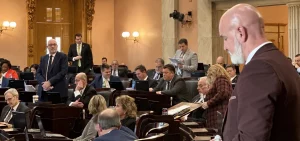News
Ohio’s House GOP caucus votes to pull the speaker’s control of incumbents’ election fund
By: Sarah Donaldson | Statehouse News Bureau
Posted on:
COLUMBUS, Ohio (Statehouse News Bureau) — A faction of the Ohio House GOP is again trying to wrest control of money set aside for campaigning incumbents from Speaker Jason Stephens (R-Kitts Hill), showing the infighting over last year’s divisive speakership election is still simmering.

The resolution members ratified doesn’t just hand the reins over to Plummer. According to its text, Plummer can create “any number of additional new” bank accounts, for the purpose of funding incumbents, provided anyone prevents him from accessing the current one.
“We dotted the I’s, we crossed the T’s,” Ferguson said.
The lawmakers also sued over the issue prior to the March primary. A judge in the Franklin County Court of Common Pleas blocked their request from last fall for a short-term restraining order on use and transfer of money in the OHRA in February, although the case is scheduled to go to trial in October.
But it hasn’t moved the needle much among the other faction, at least immediately. Jared Borg, the OHRA chief political director, said it’s another distraction from the original fund’s stated goal: to defeat Democratic challengers.
“Anything to the contrary is a baseless narrative,” Borg said.
Procedural squabbles and a looming 2025 House leader face-off
Stephens may hold the gavel, but Ferguson said a healthy faction of Republicans still don’t see him as a leader.
In January 2023, Stephens won the speakership with votes from 22 Republicans and all 32 Democrats, beating out Rep. Derek Merrin (R-Monclova), whom a bigger cohort of the Republican caucus backed.
“We all consider Derek to be the leader,” Ferguson said.
Borg said his boss is willing to work with anyone in the caucus.
“We’re always going to operate with truth and integrity,” he said, “unlike those who operate in rumors and innuendo.”
But Ferguson said Merrin backers “didn’t see a dime” during the March cycle. Four of the dozen Ohio House GOP incumbents facing primary challengers who backed Stephens’s first bid lost their races in March.
Merrin is term-limited—and current Senate President Matt Huffman has long been the likely challenger in the race.
Following a post-primary event held by the Ohio Chamber of Commerce last month, Huffman said some people want him to run to be the next speaker.
“I certainly am committed to making sure, whether it’s me or anyone else, that whoever is elected speaker is elected by a majority of the majority caucus,” Huffman said then.
Both men are running for seats in the House in November, since Huffman is at the end of his term in the Senate, and neither of them face challengers.
“Frankly, it would be better if the Senate president would pay attention to running the Senate, instead of trying to run the House,” Stephens said earlier this month. “That’s how I feel about that.”
Last year, Rep. Tom Patton (R-Strongsville) voted for Stephens. Last week, Ferguson said Patton voted to take away his control of the party’s political funds—signaling the speaker’s then-base could be further eroding.

